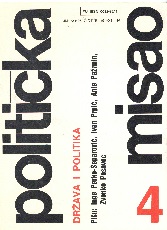Emancipacija
Emancipation
Author(s): Ivan PrpićSubject(s): Politics / Political Sciences, Philosophy, Jewish studies, Sociology
Published by: Fakultet političkih znanosti u Zagrebu
Keywords: Emancipation; Marx;
Summary/Abstract: Until the 18th century the predominating meaning of the concept of emancipation was the legal one, yet it carries an additional wider semantic potential. Through his emancipation the individual acquires freedom and equality and it is from these that the modern meaning of that concept arises, namely liberation from spiritual, social, and political tutelage, dependence, and oppression. The change of meaning in the modern age points towards its connection with the rise of the bourgeois liberal movement, and ideology. The demand that all people should become equal and free trough the enactment of general law equals to a demand that the form of the law that regulates relationships in the community should be changed; this amounts to revolutioning the set-up of the community. Thus, the process of emancipation appears to be almost identical with history understood as the taking place of human liberty. The three basic aspects of the emancipatory process are the economic-industrial, the political, and the moral-religious. There follows an account of the debate between M. Hess, B. Bauer, and K. Marx about the preconditions, forms, and possibilities of the emancipation of the Jews. In Marx's early writings the concept of emancipation has an analytical meaning but it also expresses the motivation, program, and purpose of human action. This program is also relevant to the contemporary world of today.
Journal: Politička Misao
- Issue Year: XXIV/1987
- Issue No: 04
- Page Range: 13-23
- Page Count: 11
- Language: Croatian

